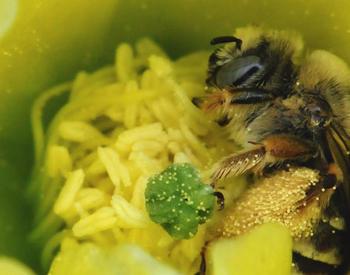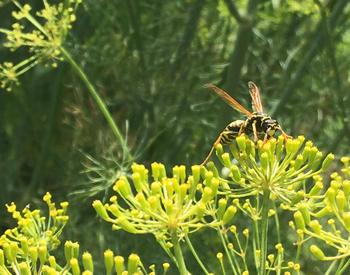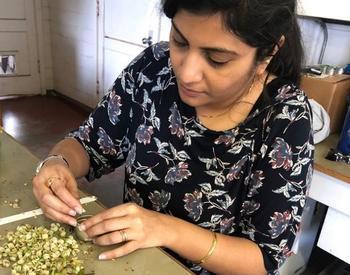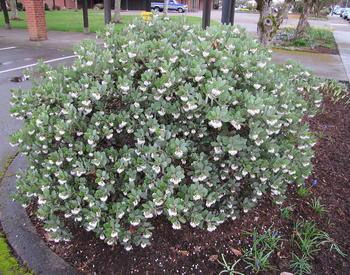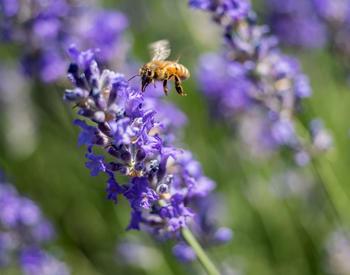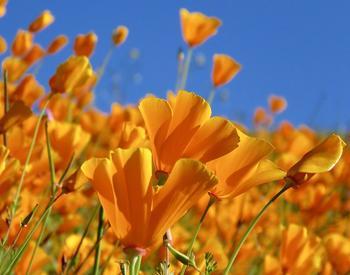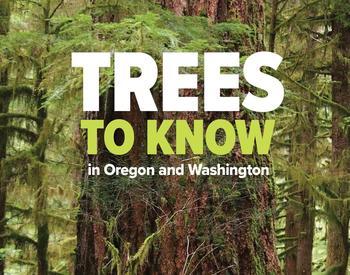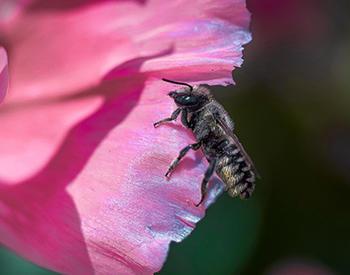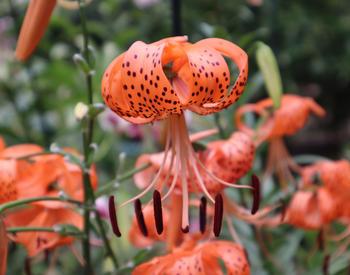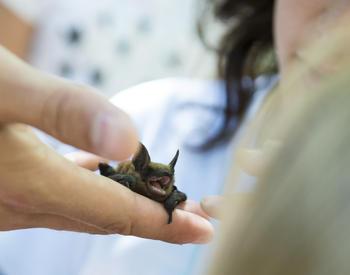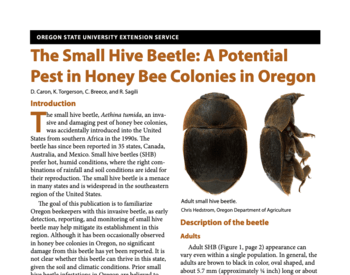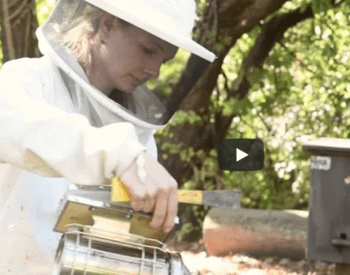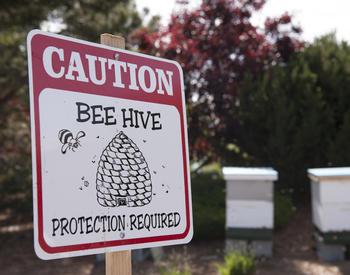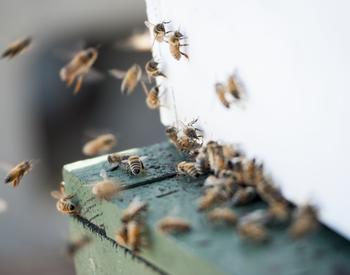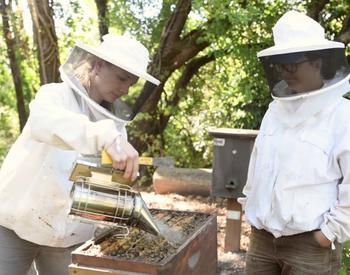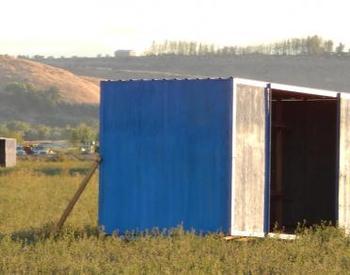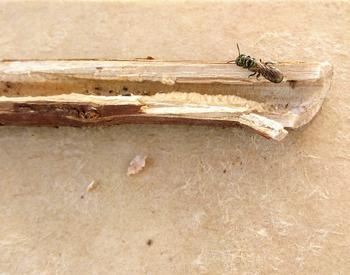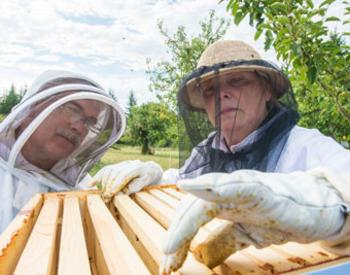Transcript
[00:00:00] Andony Melathopoulos: [00:00:00] From the Oregon State University Extension Service this is PolliNation, a podcast that tells the stories of researchers, land managers, and concerned citizens making bold strides to improve the health of pollinators. I'm your host, Dr. Andony Melathopolous Assistant Professor in Pollinator Health in the Department of Horticulture.
[00:00:33] Keeping bees in cities is not straightforward. It's not straightforward from the perspective of just like the mechanics of beekeeping in the city, but also - in a previous episode with Mike Rhodia the regulations of keeping bees in the city, but also how beekeeping can be part of making a city healthy and vibrant. As we heard in a previous episode with Sarah and Julia Common from Hives for Humanity Society in Vancouver, British Columbia. This week, we're going to go back to [00:01:00] Canada and talk with Gregory Lynch who's the administrator of Miel Montreal which is a cooperative that provides a concerted framework for educational services related to bees, and more generally to biodiversity in the city - as well as provides support to the beekeeping community in Montreal. This is a great episode and it comes from my visit to Montreal as part of the Apimondia Congress, the world congress of beekeeping that took place at the beginning of September. Hope you enjoy the episode!
[00:01:39] Hey, I'm really pleased to be here in Montreal, talking with Greg from Miel Montreal.
[00:01:45] Gregory Lynch: [00:01:45] No. You're right, Miel Montreal.
[00:01:47] Andony Melathopoulos: [00:01:47] Welcome to PolliNation!
[00:01:48] Gregory Lynch: [00:01:48] Thank you very much it's a pleasure to be here for sure.
[00:01:51] Andony Melathopoulos: [00:01:51] Now we're in the third day of Apimondia, what are some of the things that you've seen here? What were kind of the highlights for you so far?
[00:01:59] Gregory Lynch: [00:01:59] It's [00:02:00] been an incredible event. So for us, there's highlights galore. I've had the advantage of doing some technical tours before Apimondia really started up as well.
[00:02:08] Andony Melathopoulos: [00:02:08] What's a technical tour?
[00:02:09]Gregory Lynch: [00:02:09] So a technical tour is a an additional activity for anyone that's coming out for Apimondia. And so it's getting out of the Congress Centre and going to see what beekeepers actually doing in this area of the world.
[00:02:19] Andony Melathopoulos: [00:02:19] Okay.
[00:02:20] Gregory Lynch: [00:02:20] So it's been nice. We've been able to take them out to our teaching aparies and to a couple of other sites as well, including some rooftop gardens or the botanical gardens. And just talk to people about what we're doing in beekeeping, as well as in pollinator conservation as well.
[00:02:35] Andony Melathopoulos: [00:02:35] Oh, fantastic. Okay, so in-between that you've been in this huge Congress, what have been some of the highlights for you?
[00:02:42] Gregory Lynch: [00:02:42] Well, it's been incredible because everybody is here. My first day here, I just spent on the expo floor talking to everybody and looking at new tools and new technologies as well as old tools. And new ways of doing things better things, and just chatting with people about what the issues are that they're dealing [00:03:00] with locally, what they're dealing with internationally. I've done a lot of beekeeping and pollinator stuff with Melipona and Trigona as well - so crossing paths with a lot of people who are in Central America has been really nice as well. And honestly, the event is super social and sharing ideas is really what's been biggest highlight for me. I haven't even talked about the conferences though.
[00:03:20] Andony Melathopoulos: [00:03:20] Well, I remember one thing that you were talking about as well is just the one thing that's fascinating is the different hive equipment.
[00:03:26] Gregory Lynch: [00:03:26] For sure. So that's been one of the great things is we're really trying to figure out what hive equipment we should be using here in the city. Because we've historically been using Langstroths and we have Langstroths across the city, but we do find that it's not well adapted because our goals are totally educational.
[00:03:41] Andony Melathopoulos: [00:03:41] Yeah, yeah, for sure.
[00:03:42] Gregory Lynch: [00:03:42] And so we're looking at alternatives, we're looking at Warre hives. We're looking at smaller Langstroth hives, we are looking at maybe plexiglass in some of the walls. And so as we're presenting some of the ideas and the questions that we're asking, other people are throwing new ideas at me too. And we get to talk about the advantages, the [00:04:00] disadvantages, and looking at the materials that are available in the expo center. Again, there are people that are selling your normal Langstroth stuff, but there's a million different kinds of hives going on over here - it's incredible.
[00:04:10] Andony Melathopoulos: [00:04:10] Okay. So tell us a little bit about the organization Miel Montreal. Where did it get started?
[00:04:15] Gregory Lynch: [00:04:15] So Miel Montreal started with a group of students from the University of Montreal who were looking at engaging with bees - it's about eight or ten years ago. And they had no experience whatsoever in beekeeping, but they want to get involved. So they took a basic beekeeping course and threw up some hives at the university.
[00:04:32] Andony Melathopoulos: [00:04:32] Okay.
[00:04:33] Gregory Lynch: [00:04:33] And since then, we're actually a cooperative - so everyone works together to be reaching certain goals. So our goals are promoting urban biodiversity, educating people on pollinators as well as providing employment for local people. And basically their goal is to build that up and go. But within a couple of years, we quickly realized that beekeeping in the city is not actually what we should be doing - we should be looking at pollinators. So even though we're called, Miel Montreal which means, "Montreal [00:05:00] honey."
[00:05:00] Andony Melathopoulos: [00:05:00] Yeah.
[00:05:00] Gregory Lynch: [00:05:00] We do produce honey, but our work is really an education and focused on pollinators, pollinator gardens and getting people involved with those creatures and plants.
[00:05:10] Andony Melathopoulos: [00:05:10] Wow. That's a huge charge. Walk us through some of the activities, like some of the things that the organization does on a day to day basis.
[00:05:18] Gregory Lynch: [00:05:18] Sure! So, throughout the summer we keep hives - we have about sixty hives, including some nukes in there across the city. But anytime that we have a contract with one of our clients - we don't do a contract where we're just going to take care of a hive, if we're going to install a hive on someone's roof or in their back garden, they have to be an organization. So it has to be an educational institution or a business, or a city, whatever it may be. But they're obliged to also take courses with us.
[00:05:45] Andony Melathopoulos: [00:05:45] Oh wow.
[00:05:46] Gregory Lynch: [00:05:46] If they want to have the hive, they have to educate themselves.
[00:05:49]Andony Melathopoulos: [00:05:49] So this is not one of these examples of like, a caretaker will take care of anything, this is like an involved process where education's really been built into the [00:06:00] program.
[00:06:00] Gregory Lynch: [00:06:00] 100%. So if they're going to be there, they're with us on it.
[00:06:03] Andony Melathopoulos: [00:06:03] Okay. You're going to give me an example before I cut you off.
[00:06:04] Gregory Lynch: [00:06:04] Oh yeah, for sure. No problem. So I will give you the example, this is a funny example, actually, there's a place called Metaltech, so they build scaffolding.
[00:06:14] Andony Melathopoulos: [00:06:14] Oh, really?
[00:06:14] Gregory Lynch: [00:06:14] It's a scaffolding company.
[00:06:15] Andony Melathopoulos: [00:06:15] Okay.
[00:06:16] Gregory Lynch: [00:06:16] So they're in Laval, which is just North of the city and it's an industrial area and so it's not a great place to have bees actually. They wanted to have four hives and so they've decided to support these hives. And every time we go out, people scuttle out of their offices, they come up to the kitchen because it looks over to where the hives are, they come in, they want to do the visit with us. They've also followed courses with us throughout the year, but more than that, because they've been doing the education with us, when we said to them "look, you're in an industrial area, this isn't a great place to have the hives."
[00:06:44] Andony Melathopoulos: [00:06:44] Yeah.
[00:06:45] Gregory Lynch: [00:06:45] "We'd like to move them to the Centre de la Nature, The Nature Center of Laval." They're enthusiastic about it. We didn't have to go and convince them that, "okay this isn't great." No, they were on board. They said, "no, we're focused on the bees, we want to get them out to the Centre de la Nature." [00:07:00] So they endorsed us and they continue to pay to maintain those hives. And they continue to pay for their educational services because they're really onboard for the pollination and onboard to take the honeybee as your starting point.
[00:07:13] Andony Melathopoulos: [00:07:13] Fantastic. That's great. And so tell us a little bit about what goes into the education. So, one part of the activities is getting hives in the city in areas that are publicly accessible. What does the training involve?
[00:07:26] Gregory Lynch: [00:07:26] So there's a few different aspects that we can do. So the first is if we're really talking about beekeeping, people can jump on board and take a full beekeeping course, we offer a twenty-one hour beekeeping course that's theoretical, but then we also offer our summer learning apiary. So at the apiary they'll come every week or every two weeks, and they'll be doing manipulations. They'll go for the entire season from the beginning of May, right to the end of October - to really learn how to do beekeeping. But again, because we're not focused on producing honey and producing beekeepers, we want to really get people on [00:08:00] board to look at pollinator gardens and native beekeepers - so that's a large portion of what they're learning as well.
[00:08:05] Andony Melathopoulos: [00:08:05] Native beekeepers what's that?
[00:08:08] Gregory Lynch: [00:08:08] So it's one of those things that we say "beekeepers" and we have the ability in English, which is nice. That "bees" is a really broad term and we can talk about a whole lot of different insects. And so if we're talking about native beekeepers, we don't have to have the honeybee. We can have a native beekeeper who has a great pollinator garden as well as maybe a little insect hotel. So they don't have to be in there collecting honey, they don't have to be in there treating for Varroa. They're there taking care of their native bees.
[00:08:38] Andony Melathopoulos: [00:08:38] Yeah.
[00:08:38] Gregory Lynch: [00:08:38] So we want them to still think of themselves as a beekeeper.
[00:08:41] Andony Melathopoulos: [00:08:41] Because they are, I mean that is totally fantastic. Okay, all right so you've got these training programs. You're getting both people learning beekeeping skills but also with a much broader focus on stewardship.
[00:08:57] Gregory Lynch: [00:08:57] Stewardship is a great word to use. Yeah, exactly.
[00:08:59] Andony Melathopoulos: [00:08:59] And [00:09:00] so, people are coming out getting this experience, tell us a little bit of some of the stories of how this training has had impacts.
[00:09:08] Gregory Lynch: [00:09:08] For sure, so basically what we're doing is people are obviously attracted to these trainings. This is the big training and this one that I do so I talk a lot about it. There are other ones that we do as well, but, one of the big things is that people come in and they're thinking, "I'm going to go and I'm going to install four hives in my backyard." So what we're trying to do is take that really good impulse and get them on a team. So rather than having each person with four hives, we try to make teams of ten people for one hive. So we're doing collective beekeeping as well.
[00:09:35] Andony Melathopoulos: [00:09:35] That is a great idea.
[00:09:36] Gregory Lynch: [00:09:36] So now we're looking at, I'll give the example of a "Rhubarb Collective" is one of the beekeeping collectives, and I think you met Venjanet who is another trainer.
[00:09:45] Andony Melathopoulos: [00:09:45] Oh, yes. Yeah.
[00:09:45] Gregory Lynch: [00:09:45] So she launched the Rhubarb Collective last year with a bunch of the students that followed our course and some other people that were just interested. I think there are about a dozen of them now, they have two hives and it's right beside one of the biggest parks in Montreal. [00:10:00] So there's lots of forage and they've been planting pollinator species as well - so there's lots of nectar close to the hives too. And so it's exactly the kind of model that we want to use. We want to take that impulse where people want to engage with the bee, but expanded out a little bit. So if we take Rhubarb again, it's Closulactoue - it's an interesting place as well. I'll give a small parentheses, it's a circus school, but also an educational school for people on the environment.
[00:10:25] Andony Melathopoulos: [00:10:25] My goodness!
[00:10:26] Gregory Lynch: [00:10:26] Yeah, it's interesting. So they're one of our clients and they have two hives and then Rhubarb has put their two hives there too. But when you go to visit, because of the way we're trying to give context for the whole thing. When you go to those hives, you're obliged to walk a pollinator garden as well. And as you walk the pollinator garden, there's little posts with a species of plant that's giving pollen and nectar, and then a species of pollinator that really loves that pollen and nectar from that plant. So when you're going to go see the honeybees, you're also going to learn about all of our native bees here.
[00:10:55] Andony Melathopoulos: [00:10:55] A fascinating dimension of this is [00:11:00] that the organization started with beekeeping and then transitioned on. Now this same transformation, probably people first come because of the enticement of honeybees are just so fascinating
[00:11:12] Gregory Lynch: [00:11:12] For sure.
[00:11:13] Andony Melathopoulos: [00:11:13] But that you've thought really deliberately of activities that really bring people along to that full scope.
[00:11:21] Gregory Lynch: [00:11:21] Yeah, and it is, and it's certainly something we're still developing. We haven't quite got there yet because I have to admit I'm a beekeeper myself and I love bees and I've been learning about our native bees, just as much as our students have too. We had, Marc Sardi was on our board a few years ago, and he's really the one that started to kind of bring this tendency for the organization. But now what's really great is because we're all on board with this and we understand kind of that urban beekeeping is great, but it's a starting point. We ourselves are also investing a lot more in the pollinator garden side of things.
[00:11:56] So yes, we have a full developed program for beekeepers to learn how to become [00:12:00] beekeepers native or otherwise. But now we're also developing a lot more education focused on pollinator gardens and using native plant species that are more drought resistant as well that'll produce nectar and pollen as well as homes for our native bees.
[00:12:14] Andony Melathopoulos: [00:12:14] Fantastic. Well, let's take a quick break. I'm sure this is a very challenging set of activities to pull off. So, let's take a break and come back and I want to ask you a little bit about some of the challenges.
[00:12:24] Gregory Lynch: [00:12:24] Sounds good.
[00:12:36] Andony Melathopoulos: [00:12:36] Okay. We are back. So I want to start by talking about this, you talked a little bit about it and every city is like this - everybody's interested in getting into beekeeping. It's almost hard to deal with this level of enthusiasm. Can you just tell us a little bit about what it's like having an organization like this and having so many people? It's just like, "I want to be a beekeeper and I want to have some honey." How [00:13:00] do you deal with that?
[00:13:01] Gregory Lynch: [00:13:01] It's an interesting question and an interesting dilemma for us as well, because you're right, everyone is enthusiastic and the bee is a fuzzy mascot of biodiversity, which is fantastic. And it's very cute and people want to latch on, plus honey is always a very attractive one as well. And so we try to grab that energy and we just try to direct it in the right direction. And we're still learning that's for sure. So myself, I was a beekeeper outside of the city, but as a hobbyist as well before I got here and when I got here, I realized there's a lot more complexity to the question than I really thought. I figured I'd throw up a couple of hives when I got here as well and just continue beekeeping as a hobby.
[00:13:42] When I got involved with Miel Monteral I realized that there's issues of density - there's issues of too many bees or too many beehives in the city, and lack of forage, obviously those two are really linked. And then we keep asking ourselves the question, "is there competition between a [00:14:00] honeybee and a native bee?" During a bunch of the different conferences as well, that question comes up a few times, both in urban and in rural environments - but we still don't have an answer. And so we're trying to figure out exactly what our role should be as we are training people too - to try to deal with questions of density of forage and as well of competition between those bees.
[00:14:21] Andony Melathopoulos: [00:14:21] Okay. So, the one thing that I thought was really interesting is that you're thinking about those questions of stewardship in a charter from Miel Montreal. Tell us a little bit about what it's about and what you're hoping to accomplish with it?
[00:14:39] Gregory Lynch: [00:14:39] Yeah. So it's interesting. So the Charter came out a couple of years ago we were like, okay, we know that there are questions to address, we know we need more research and we know that there are problems already in place. We see it particularly in the month of August bees get really hungry and it's dry in the city, there's not a lot of forage. And so they end up eating their stores, which is fine by us, but if you're a beekeeper looking for honey as well, they tend [00:15:00] to harvest just before it gets dry. And then you have to feed in August, which is a weird problem to be dealing with.
[00:15:07] So the Charter is something that we've kind of drawn up to try to give guidance to our municipal government and potentially to the provincial government. But we're really focused on municipal one to say, "we need help from the city, we need support from the city to be dressing beekeepers, to take that energy that people have to be engaging with the bee, but to really funnel it in a positive way."
[00:15:26] And so in order to do so, the charter outlined something along the lines of, "if you want to be a beekeeper, you need to be well trained and know how you're dealing with bees." We need to maybe limit the number of bees on the Island. So Montreal is an island and it's a very big island, but we maybe need to look at a number of limits. There are other cities in Quebec that have done it, including Gatineau. So Gatineau right now they have an organization called, Apisontres. So they're really focused on the bee, they are central on the bee. And they have worked with the municipality to come up with the training program. If you want to become [00:16:00] a beekeeper in the city, you have to follow this training program. If you succeed in the training program, there's a certain number of tickets that you can have to have a hive in the city.
[00:16:10] Andony Melathopoulos: [00:16:10] Okay.
[00:16:11] Gregory Lynch: [00:16:11] So in that way they're limiting the number of hives in the city, but also ensuring that there's the skills there in order to be able to take care of those hives.
[00:16:19] Andony Melathopoulos: [00:16:19] Fantastic, okay.
[00:16:19] Gregory Lynch: [00:16:19] Yeah. So there's a lot of density in the city - maybe that's not the right solution, but it's something that we're launching. We're trying to get people on board with, to really focus on, "we need to be taking care of biodiversity, not necessarily the honeybee." And if we are taking care of the honeybee, we need to do so in a way that is responsible.
[00:16:35] Andony Melathopoulos: [00:16:35] You know what I was just thinking, the funny thing is you get into beekeeping and sort of, you get all these skills and you get into it. And then you're like, "oh, there's a lot more bees!" And so then there's this whole other skill set of like native bee taxonomy.
[00:16:48] Gregory Lynch: [00:16:48] Oh yeah!
[00:16:49] Andony Melathopoulos: [00:16:49] But then it turns out, "oh, I actually have to be a botanist now." And so you end up like having an expanded journey through this. It's like, "wow, I'm [00:17:00] actually a Renaissance person now."
[00:17:02] Gregory Lynch: [00:17:02] Journey is definitely the right word. These technical tours have been exactly that. Like I've been taking people around - we have a really great pollinator garden, but I don't take care of the pollinator garden, our plant specialists do. So I'm going through and I mean like, well, I know like Bulkage or I know, sorry, I'm stuck on the French names, but the Valtradough or we have sunflowers - this kind of thing. I know a couple dozen plants that's okay, but I can't name every single one of them. And then suddenly there's twenty-five different species of native bees that are on these flowers as well. And I can name only five or six of them, but it's getting people started.
[00:17:37] Andony Melathopoulos: [00:17:37] It raises this question for a small organization like yourself and, you know, with a really broad charge, there must be challenges inherent with trying to cover off all of these areas. How are you managing?
[00:17:49] Gregory Lynch: [00:17:49] It's a great question. So that's something that we're still transitioning and we're still learning. So one of them is, I was mentioning that the Langstroth hive is maybe not the best hive for us. And so we're looking at [00:18:00] alternative hives that we could use, whether it's a Warre hive or a smaller version of the Langstroth using plexiglass - so we don't always have to be doing openings of the hives when we're doing educational practices. And we're doing some experiments to see which would really be best.
[00:18:14] And then on the other side, it's making sure that we have expertise in house, or at least within our radius, because Miel Monteral is a cooperative. So we have a few staff that are full time, and then there's a lot of people like me and a few of the other people that you've met at the conference as well, who kind of orbit around the co-op. So I spend ten, fifteen hours a week with the co- op, it's not my full time job - but ten to fifteen hours a week is a pretty tight orbit anyway.
[00:18:40] And I feel that I do bring some expertise on beekeeping. But then we also have someone like Venjanet who you met, who's a biologist herself, so she can bring a biological perspective. And then we've got two horticulturalists, so they're going to come in and bring in plant specialists. And then when we teach the portion on pollinators, we have a pollinator specialist that will come in and do [00:19:00] that aspect. So rather than me going in and just teaching you how to check how many Varroa have dropped on your bottom board, on your sticky board, or looking at the delement of queens throughout the season. No, we're going to have someone in talking and give you all of the context from a real specialist as well.
[00:19:16] And the specialists are enthusiastic to have the audience. Because if you're selling a workshop on pollinator plants, you might not have a whole lot of people out, but if you have beekeepers that are obliged to then follow that course, you've got a big audience that's enthusiastic as well because they see why and they connect to why it's so important.
[00:19:35] Andony Melathopoulos: [00:19:35] You know, the one thing that struck me about this meeting, I was at Apimondia in 1999. And you know coming here years later is how the industry has changed. And one of the things that has changed, even the word "industry." I mean, it's like, there's a lot of these new dimensions of beekeeping that are entirely new and exciting, but also, you know the [00:20:00] integration into the rest of the apiculture community. So urban beekeeping, I think is one of those things. And even the way that you've defined it is like it's sort of not even urban beekeeping in some ways it's gone far beyond that. So how have you viewed that dimension?
[00:20:18] Gregory Lynch: [00:20:18] It's an interesting one. And I think it's something that is always going to be a little bit fuzzy, but we're trying to define ourselves as well. I was in an interesting workshop earlier, just now, and we're talking about the future of beekeeping. And one of the things we're talking about is, "okay there's a lot of young people to try to get into beekeeping right now, there's urban people that are trying to get into it, there's also a lot of rural people that are passing on their hives as well. Where's beekeeping going?" And there was an interesting point brought up that a lot of the people that are living in cities are having one, two, three hives, or they're part of a collective or they're part of a cooperative. And they're passionate and they are learning as much as they can, but it's not necessarily their field of expertise, [00:21:00] but maybe there's one, who's a politician, there's another one that's a policymaker and there's someone else that is an industry leader.
[00:21:06] And so maybe you're making scaffolding in Lavel, but when someone asks you a question or you're going to go vote for someone, and they've mentioned bees, you're like, "you know what, I learned about that, that is an important question and we do need to take care of these things." So having urban beekeepers, I think we'll have a lot more influence on policy and the way that we really build our cities too.
[00:21:28] Andony Melathopoulos: [00:21:28] Fantastic. Well, let's take another break. I have a couple of questions to ask you. I ask all of my guests the same questions. So you're not getting away. We'll be back in one sec.
[00:21:37] Gregory Lynch: [00:21:37] Perfect. Thanks a lot.
[00:21:49] Andony Melathopoulos: [00:21:49] Okay. We're back. So the first question we have, do you have a book recommendation for our audience?
[00:21:55] Gregory Lynch: [00:21:55] Yeah, there's a new book that just came out this year pretty focused on Quebec, but it's [00:22:00] called ????? by Alan Perika. So this is the bee and it's hive.
[00:22:06] Andony Melathopoulos: [00:22:06] Yeah.
[00:22:06] Gregory Lynch: [00:22:06] And this book is the first book that's come out really focused on our climate. Because as we say, beekeeping is local. So the great thing is a lot of the resources available in French for beekeeping come from France - their climate is nothing like ours. Not to mention they have different bees, they have different pests, everything is different. So we ended up taking a lot of American stuff, which is also it's a different language, so we, we have to translate a lot. So it's really nice to have a great beekeeping guide that's written here in Quebec.
[00:22:35] Andony Melathopoulos: [00:22:35] I have to say yesterday there was an urban beekeeping workshop and one of the things that came up was, climatic zone. So it was like temperate, tropical, and then we pulled it off the internet was, "very cold." And so somebody said, can you define very cold? And the person from Montreal said, "here."
[00:22:56] Gregory Lynch: [00:22:56] You've got it right here. That's the crazy thing of the [00:23:00] city too, is like very cold is like minus 35, but in the summertime, it's also plus 35. So it's this particular habitat.
[00:23:08] Andony Melathopoulos: [00:23:08] Okay. So the next question I have, is there a go to tool, a tool that you just really find indispensable for the kind of stuff that you do?
[00:23:14] Gregory Lynch: [00:23:14] Yeah, exactly. It's funny. It's not, not a huge massively profound tool, but something that it's
[00:23:19] Andony Melathopoulos: [00:23:19] It's not a physically big one?
[00:23:21] Gregory Lynch: [00:23:21] No, it's tiny, it's just a little a film canister that's transparent. Because I always find something, so it's always in my bag here - whether it's a dead bumblebee on the street or maybe it's a bee that's lost its abdomen but it's still walking around for some reason. I always collect them up and then I can show it around to my students or to people that are interested, or my friends when I go to have dinner with them.
[00:23:44] Andony Melathopoulos: [00:23:44] And they're absolutely great because there's a way in which like it allows people to get very close to an insect and make observations on them with feeling safe. Their personal safety is secure.
[00:23:57] Gregory Lynch: [00:23:57] Fear is such a big one, particularly in an urban [00:24:00] beekeeping. People are so afraid of the bees. So it's a great way to get people a little bit less afraid and get nice and close.
[00:24:05] Andony Melathopoulos: [00:24:05] Fantastic. Okay. So the last question I have for you is do you have a favorite pollinator species?
[00:24:11] Gregory Lynch: [00:24:11] So I do. I'm going to go a little bit broader, I'm just going to say sweat bees in general are my favorite.
[00:24:16] Andony Melathopoulos: [00:24:16] Oh good, yeah.
[00:24:16] Gregory Lynch: [00:24:16] Well they are so flashy, well most of the time anyway. And so, because we work a lot with people of all different ages and that includes really young people, so kids of six or seven when they see I sweat bee, they can identify it really fast. And when we're working with older people in their sixties, seventies or eighties, even if their eyes are maybe not as good as they used to be, they can still see and identify a sweat bee.
[00:24:38] Andony Melathopoulos: [00:24:38] I think that is true - having a couple bees that people can easily identify helps that whole process. Native bee biology is intimidating. If you can get a couple of them down and feel confident with it, it really helps with your observational skills
[00:24:56] Gregory Lynch: [00:24:56] For sure. And then they can always discuss it a little bit more in detail and then look [00:25:00] it up. But it's a good starting point for sure.
[00:25:01] Andony Melathopoulos: [00:25:01] And it's also a great plug, I think in a week or so we will be having Sarah Cooker on who is a Halictidae specalist from Harvard. So I'm really curious to find the ins and outs of that genera.
[00:25:18] Gregory Lynch: [00:25:18] Oh, I'm excited. Okay, I'll be looking forward to that podcast that as well.
[00:25:21] Andony Melathopoulos: [00:25:21] It has been really great to have you on the show. Thanks so much for taking time in this very busy Congress.
[00:25:26] Gregory Lynch: [00:25:26] Thank you very much. It's been a real pleasure.
[00:25:35] Thank you so much for listening. The show is produced by Quinn Sinan Neil who's a student here at OSU in the New Media Communications Program. And the show wouldn't even be possible without the support of the Oregon Legislature, the Foundation for Food and Agricultural Research and Western Saharah. Show notes with links mentioned on each episode are available on the website, which is at pollinationpodcast.oregonstate.edu. I also love hearing from [00:26:00] you and there's several ways to connect with me, the first one is you can visit the website and leave an episode specific comment, you can suggest a feature guest or topic, or ask a question that could be featured in a future episode. But you can do the same things on Twitter, Instagram, or Facebook, but visiting the Oregon Bee Project. Thanks so much for listening and see you next week!
Ever heard the term “native beekeeper” before? Me neither, until I talked with Gregory Lynch from the Miel Montréal Co-op. In this episode he explains how the Co-op has developed a wide range of educational services that goes beyond (honey bee) beekeeping, to promoting native bees and urban biodiversity more generally.
The mission of Miel Montréal Co-op is to develop and provide, within a concerted framework, educational services related to bees and more generally biodiversity in the city, as well as support to the beekeeping community.
Gregory is a trainer and beekeeper with Miel Montreal and has had the opportunity to work with bees of all sorts in Eastern Canada, Central America and West Africa. Gregory has a masters from the University of Luxembourg in sustainable development, he has over 10 years of experience in animation with non-profitable organizations, companies, families, farms and students from all ages. Currently Gregory runs Mantis environmental, a small business focused on training and consulting in sustainable development.
You can Subscribe and Listen to PolliNation on Apple Podcasts.
And be sure to leave us a Rating and Review!
Links Mentioned:
Gregory’s Favorite Book: L’abeille et la ruche (Alain Péricard, 2019)
Gregory’s Go-To Tool: Transparent vial for showing bees to people
Gregory’s Favorite Pollinator: Green metallic sweat bees (because its easy for beginners to see)
